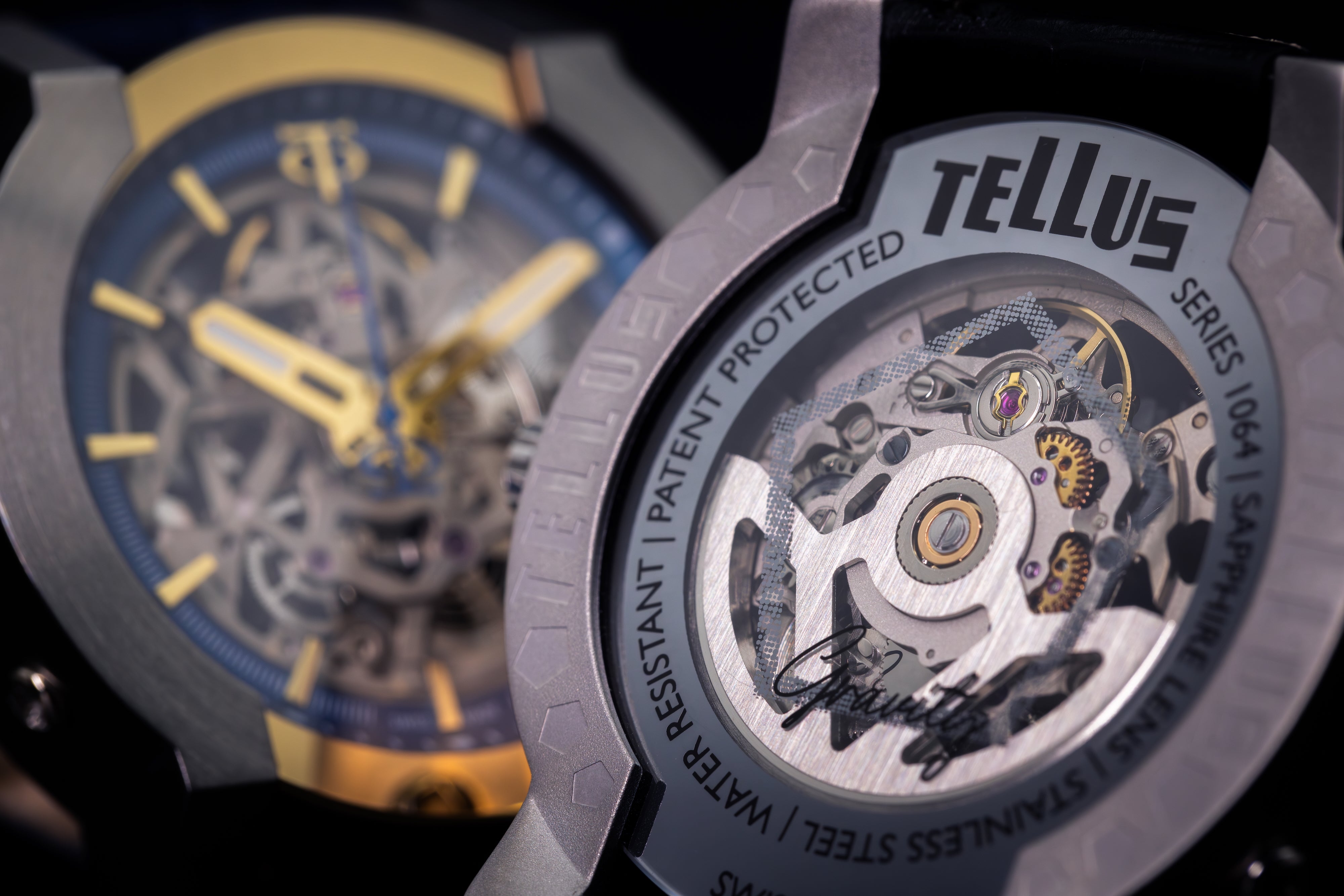Automatic, quartz or mechanical: which type of movement should you choose?
Automatic, quartz, or mechanical—three approaches to time, three ways to design a timepiece. While these terms often come up in watchmaking, they are not always well understood. The choice of movement is far from trivial: it determines not only how the watch functions but also its personality, utility, and long-term value.
Knowing how to differentiate a quartz movement from a mechanical one, or understanding what sets an automatic watch apart from a manual one, helps refine your selection criteria accurately. It also sets expectations for what you want from a timepiece: constraint-free reliability? An intimate relationship with mechanics? A balance of both?
At Maison Tellus, each movement is selected with care—whether it’s a Swiss automatic caliber or a traditional manual mechanism. The key is finding the one that matches your lifestyle, rhythm, and relationship with time.
Why the Choice of Movement Is a Fundamental Criterion
Few people choose a watch based solely on appearance. Behind the dial lies an element that truly matters: the movement. It drives the watch, guarantees precision, reliability, and longevity. The movement is to the watch what the engine is to a car: unseen, but essential.
Opting for quartz, manual, or automatic movement means choosing a rhythm, a relationship with time, and a level of daily involvement. Manual winding requires a regular ritual; automatic movements breathe with your wrist; quartz offers quiet precision and minimal maintenance.
This decision also impacts perceived value. Connoisseurs scrutinize the caliber’s quality, movement finesse, and the appropriateness of the movement for the watch’s purpose. A sports performance piece won’t meet the same requirements as a collectible or evening watch.
At Maison Tellus, the movement is integral to the experience. It supports a mastery of time, horological expertise, and precision customization.
Quartz Movement
Introduced in the 1970s, quartz movements revolutionized watchmaking. Unlike mechanical or automatic watches, quartz relies on a battery powering an electronic circuit. A tiny quartz crystal vibrates at a constant frequency under voltage, ensuring precise timekeeping.
Advantages:
- Extremely stable—can run for years without adjustment.
- Cheaper to produce, hence widespread.
- Low maintenance—a battery change every 2–3 years.
Quartz movements are ideal for jewellery watches like Maison Tellus’s Diamanta, worn occasionally without time setting. However, they lack the artisanal nobility of traditional mechanics and don’t evoke the same emotional connection as mechanical movements. Their silent operation and reliable analog display make them perfect for everyday, maintenance-free wear.
Maison Tellus offers quartz models in its minimalist collections for those seeking Swiss-made reliability and elegance without mechanical complexity.
Manual Mechanical Movement
Before electronics and rotors, manual winding was the only power source. Manual mechanical movements rely on a mainspring wound via the crown. The stored energy gradually unwinds, powering the hands.
This movement appeals through technical purity and tradition. No external energy source is needed. Winding daily (or every two days depending on the model) becomes a ritual—an engaging interaction with the passage of time.
The allure lies in its complexity—often visible through a transparent caseback. Finishing quality, component precision, and regulation accuracy signal high craftsmanship. But it demands commitment and isn’t for those seeking simplicity.
Maison Tellus’s Arès collection features exceptional manual movements, chosen for their mechanical balance and timeless aesthetic—crafted for connoisseurs who value technical elegance and the pleasure of winding.
Automatic Movement
An evolution of manual mechanisms, automatic movements eliminate daily winding. A rotor converts wrist motion into energy to wind the mainspring, keeping the watch running as long as it is worn.
Automatic movements blend traditional mechanics with convenience. They embody haute horlogerie: a living mechanism, discreet yet always in motion.
Benefits include:
- No battery needed.
- Decent accuracy.
- Power reserves typically between 38–72 hours (up to 5 days in Tellus’s Dueller series).
- A sense that the watch “lives” with you.
However, automatic movements require care. If unworn for days, manual winding is needed. They can be more shock-sensitive than quartz due to mechanical complexity. Maison Tellus selects Swiss automatic movements for their robustness, precision, and craftsmanship. Paired with the Parenthèses personalization system, they offer a watch unique in both design and mechanics.
How to Choose Based on Your Needs
There is no universal answer. A mechanical-enthusiast’s preference won’t suit someone seeking precision and low maintenance. To choose wisely, consider:
- Usage frequency: Quartz suits those who want reliable, no-hassle wear. Automatic watches are ideal for daily wear—they wind automatically if worn regularly.
- Affinity for mechanics: If you appreciate internal workings, the ritual of manual winding, or visible mechanics, choose mechanical or automatic.
- Investment perspective: Quartz offers accessible entry into luxury, but high-end mechanical or automatic timepieces often have stronger collector value, especially Swiss calibers from famous brands.
| Criteria | Quartz | Mechanical (manual) | Automatic |
|---|---|---|---|
| Energy | Battery | Wound mainspring | Wrist movement |
| Maintenance | Low (battery remplacement) | Regular (manual winding) | Moderate (wear or manual winding) |
| Accuracy | Excellent | Good | Good |
| Heritage Value | Moderate | High | High |
| User experience | Simple | Ritualized | Spontaneous |
| Average Price | More affordable | Variable | Mid to high-end |
Maison Tellus offers models across each segment, featuring reliable Swiss movements tailored to user expectations. Their tailored approach allows each client to configure a watch that reflects both personal design and internal rhythm.
Maison Tellus and Watch Movements
Since 1926, Maison Tellus has upheld a vision balancing mechanical tradition, functional innovation, and timeless design. This is reflected in their choice of movements—selected for reliability, precision, and brand ethos.
Whether you seek quiet quartz precision, handcrafted manual elegance, or the versatility of an automatic caliber, their collections let you orient your watch to suit your lifestyle.
But Maison Tellus goes further. Thanks to the exclusive Parenthèses system, each timepiece can be personalized down to subtle components—case, dial, indexes, hands. The movement then becomes a central element of this personal expression, a carefully selected internal rhythm in a bespoke watch.
This approach merges Swiss excellence (Swiss Made certified) with rare customization freedom—resulting in a watch that’s not just well designed, but deeply embodied.
Conclusion
The choice of movement is more than technical—it defines your relationship with time, mechanics, and the object itself. Quartz, mechanical, or automatic, each mechanism embodies a vision, a use, a sensitivity.
The key is choosing based on what you expect: silent precision, intimate ritual, or discreet autonomy. None is intrinsically superior; each serves a different purpose.
Maison Tellus understands this. Their collections offer, beyond refined aesthetics and quality finishes, Swiss watch movements suited to every profile. And with the Parenthèses customization, the mechanics naturally extend your personal style, rhythm, and story.
To Explore Further
- Collections: Arès / Diamanta / Discoverer / Dueller / Explorer / Stormer
- Configure your own watch or deepen your knowledge
FAQ
What’s the difference between an automatic and a quartz watch?
A quartz watch runs on a battery powering a quartz crystal for stable, accurate timekeeping requiring minimal maintenance. An automatic watch uses a mechanical rotor powered by wrist motion—no battery needed, but requires regular wear or winding.
How does a manual mechanical watch work?
A manual mechanical watch is powered by a mainspring wound via the crown. The spring releases energy gradually to drive the mechanism. It typically needs winding every 24–48 hours.
What are the advantages of mechanical watches?
Mechanical watches offer strong ties to horological tradition, high craftsmanship, mechanical beauty, and mechanical energy—they're prized collector pieces.
Why choose a quartz watch?
Quartz watches are known for precision, low maintenance, and affordability. Ideal for daily use or those prioritizing practicality over mechanical complexity.
Which type of watch is best to start with?
For a first watch, it depends on priorities. A high-end quartz watch offers reliability and style without complication. If you want to explore traditional watchmaking, an automatic with a comfortable power reserve offers a good balance between authenticity and ease of use.





Leave a comment
This site is protected by hCaptcha and the hCaptcha Privacy Policy and Terms of Service apply.